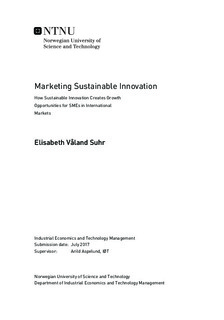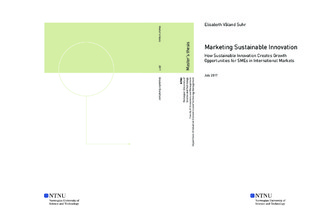| dc.description.abstract | An increasing global focus on socio-ecological problems, stricter policies and regulations and advanced technological innovations are putting pressure on companies to develop and market more sustainable products and processes. Though sustainable innovation is becoming a mainstream concept, research on sustainability marketing is still limited. This despite its positive impact on market shares, profit and competitive advantage. Companies are also to a higher degree turning to emerging markets, as they see these as enormous opportunities for growth. It is therefore interesting to study the relationship between sustainable innovations and marketing, and opportunities for growth in both developed and emerging markets. Current research is limited on the relationship between sustainability marketing and opportunities for growth and this study will attempt to shed more light on the topic.
The study aims to answer two research questions. The first questions studies how small and medium-sized enterprises (SMEs) can use sustainability marketing to create opportunities for growth in developed markets. The second question studies how these same innovations can be used as a means to entry into emerging markets. These questions are answered through an exploratory single-case study of a small Norwegian industrial company.
The first research question takes into consideration the already established market of the company, in developed countries, and investigates how sustainability marketing can create opportunities for growth in this market. The second question looks at opportunities for entry into emerging markets. By answering these questions, I hope to find common characteristics of successful sustainable innovations and marketing strategies.
The results of the study show that the characteristics of the market segment and industry are important to take into consideration when engaging in sustainability marketing. In the developed markets, characteristics such as industry size and age, as well as conservatism and risk aversion were prominent. In the emerging markets, infrastructure, educational levels, climate and resource scarcity were important characteristics. The characteristics of each segment largely influenced their demands and responsiveness to sustainability marketing. The study also found that creating a trustworthy sustainable image from the inside out, while cooperating with partners, institutions, value chain actors and customers was important for the success of sustainability marketing. These findings are condensed in a proposed framework for managing sustainability marketing. | |

